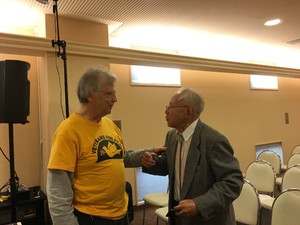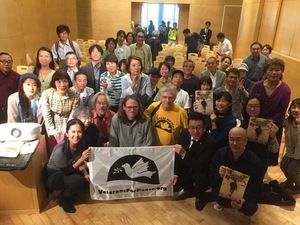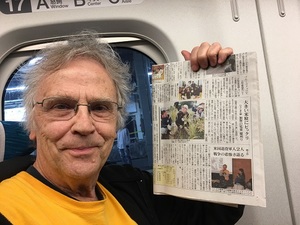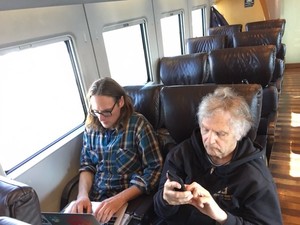VFP Speaking Tour in Japan - Report 1 -
Eiji was twelve years old when Kofu was bombed flat. Now well into his eighties, Eiji retains a youthful glow. Eiji was joined by his wife. They sat in the front row and were the only locals in attendance that remember the U.S bombing raids in the area. About 90 other people filled the conference room and listened as Mike Hastie, Rachel Clark and Nathan Lewis kicked off the 2018 speaking tour in Japan, the third tour since 2016 but the first with a Vietnam and Iraq war veteran.
We began with an apology on behalf of the peaceful segment of the U.S population. We apologized for the continued occupation of Okinawa on behalf of all VFP members. A moment of silence was called. My thoughts went to the Iraqi mother wailing over her dead child lying beside a road somewhere outside Baghdad. I thought of the deformed babies from Agent Orange preserved in jars at the War Remnants Museum in Ho Chi Minh City. Many heads in the audience were bowed and faces somber. There are many dead to keep in our thoughts. Mike Hastie led with a powerful collection of photographs. One showed him in Tokyo as a young boy 1949. His father was with the U.S Army, mapping Korea and China from B-25s using highly sophisticated camera equipment photographing the terrain which was later used for the printing of maps, which US Military troops used in the combat field. They were laying the groundwork for the Korean War. They were laying the groundwork for Mike's war, Vietnam. Laying the groundwork for my war, Iraq.
Our presentation lasted just over two hours but nobody seemed to mind. The audience asked excellent questions and lingered in conversation until the hotel staff herded us towards the exit. They thanked us for coming and sharing our stories. Afterwards we drove to the outskirts of the city and ate dinner at a very old wood and earthen building that has been a Saki distillery of over 200 years. The food was delicious and we continued to speak about war, empire, and how teenagers are on their cell phones too much. We felt good about our first speaking event and excited for the next day's travel and event.
From Japan in good spirits,
Mike, Rachel and Nathan. Out.

VFP Japan Speaking Tour - Report 2 -
In Kyoto, Ritsumeikan Univiersity's Peace Museum's "Friendship Society of Peace" invited Mike, Nathan, and Rachel. One of audience was Rumi Hanagaki, survivor of the atomic bomb dropped in Hiroshima. Since she was 6 years old, Rumi had lost her memory which suddenly came back to her decades later. Here is Nathan's report who had a quality conversation with her during the lunch time after the event:
Sometimes memories are too horrible and they go somewhere else until later on. Rumi Hanagaki survived Hiroshima. She was five years old. She didn't remember much until sixty years later. The memories came back to her; household goods, everyday items, blown into a pile on the riverbank, her mother carrying her away from the flames. She sits beside me at lunch and tells me her story. We are at Ritsumeikan University. During my presentation, I show examples of the paper we make from military uniforms. We call it Combat Paper. She shows me her business card made from paper cranes left as offerings at the Hiroshima museum. Traditional Japanese paper is called washi. Her washi on the table next to my Combat Paper looks very similar but the washi has more color. There are threads and flecks visible in both. She is kind and it is difficult to eat lunch with such a heavy heart. Today the audience is filled with folks that volunteer at the Kyoto Museum of Peace. Clearly, they are very committed peace activists and their questions reflect a very deep understanding of the issues we are here to speak about. After our meeting, I remember their kind eyes and gracious and calming presence. I am left wondering who is teaching whom on war and healing.

2018 VFP Speaking Tour Report - 3 -
Our presentation at Kanazawa was once again very informative and emotionally powerful for the Japanese audience. The room was packed with over ninety people. There were several newspaper reporters in attendance, along with a T.V. news crew. Nathan and I were interviewed by a couple of reporters who wanted us to clarify certain comments we made in our individual talks. When we were interviewed by the local T.V. station, they asked both of us the same question: " What is your main message to Japanese audiences?" I answered that question by saying: "War has nothing to do with protecting America's borders. It has absolutely nothing to do with freedom and democracy. U.S. wars are always about corporate profiteering, and global dominance. Wherever U.S. corporations go, the U.S. military follows to protect those corporate interests.
I emphasized that the word WAR, stands for Wealthy Are Richer." The audience seemed to hang on every word that Nathan and I said. As I noticed the facial expressions of people around the room, I could tell the content of our information was having an impact on them. I have often said, the truth is always in the details, and that is what Nathan and I tried very hard to deliver. I think Japanese audiences are not use to hearing American veterans being so honest and emotionally critical of their government. Nathan and I gave detailed information concerning the scope and dangerous nature of the U.S. Empire, after all, the U.S has bombed 30 countries since the end of World War II.
I quoted Martin Luther King Jr. when he said on April 4, 1967: "The greatest purveyor of violence in the world today is my own government." Nathan and I gave examples of this when we talked about the war in Viet Nam and Iraq. We reiterated that the war in Viet Nam and Iraq were complete and total lies.
In the question and answer period, I was asked to give examples of those lies. I talked about how the U.S. was brought into the war with Viet Nam based on fabricated information and deceit involving the Gulf of Tonkin Resolution, and the sabotage of the 1956 election, which would have no doubt lead to Ho Chi Minh being elected president. With the Iraq War, it was later proved that Saddam Hussein never had Weapons of Mass Destruction, nor was Iraq ever involved in the September 11, 2001 attack in New York City. All of this was totally fabricated by the United States Government.
My main question to the Japanese audience was this: Does Japan really want to politically and economically aligned themselves with the most violent government that has ever existed on the face of the earth? Article 9 of your constitution is your greatest treasure. Article 9 contains statements like; "the Japanese people forever renounce war", and "land, sea, and air forces, as well as other war potential, will never be maintained". If Article 9 is repealed, and Japan is given the green light to expand their military might, it will in the long run spell disaster for the Japanese people. Once Japan decides to further become a U.S. Military partner, that marriage will lead to U.S. ownership, as peace is absolutely foreign to the United States. America is addicted to war, therefor my greatest hope is that the Japanese people become addicted to peace. Japan cannot have it both ways.
Mike Hastie
U.S. Army Medic
Viet Nam 1970-71

2018 VFP Speaking Tour Report - 4 -
One of my grandfathers was too young to fight in WWII. One of my grandfathers was too old to fight in WWII. My older grandfather was a machinist and worked in Ohio. He built B-29's. I've walked through the gleaming and tidy cities rebuilt after the war. Largely they were destroyed by the B-29's and other similar bombers.
There have been relatively few younger folks at many of our speaking events so far, except when we are on a university campus. We enjoyed excellent sunny weather for our event at Kansai University in Osaka several days ago. The room contained several classes and was mostly full with over 90 students. As Mike spoke I noticed the students were very attentive and engaged. They made eye contact, their faces registered that they were listening by showing emotion, and most importantly, they ignored their phones. Anyone who has spent time in an American classroom recently, whether elementary or graduate school, whether as a student or teacher, knows how rare attentive and engages students are. As usual the students asked many questions that also showed they were engaged and thinking.
As we were packing up to leave, a young man came up. We talked for a few minutes and I asked him if he knew any Japanese veterans of WWII. He said yes, his grandfather built and flew airplanes, mostly Zero fighter planes. I told him my grandfather built the planes his grandfather built to shoot down. As we walked out of the classroom I said, "Our grandfather's generation was at war with one another. They were at each other's throat. May our generation do better. To each other and to others." We hugged and I saw in his eyes that he agreed with me.
Nathan Lewis

2018 VFP Speaking Tour Report - 5 -
As I write this, the beautiful landscape of Kyushu island passes by outside our train window at 80 mph. The land is either rolling green mountains, high density houses and industry, or agricultural fields. The mountains are never far in Japan. Some are small with the occasional house or temple on a ridge. Others are much larger and often shrouded in mist. It is rare to see a deforested hillside or signs of serious erosion. The houses are all well taken care of and modest in size, but with elegant design features. Perhaps the neatest and most orderly thing one notices in Japan is the agricultural land. The fields are immaculate. No weeds, no sloppy hedgerows and certainly no piles of junk. Many houses have wonderful and productive gardens just outside the back door. The soil appears rich and moist.
We are on our way to Nagasaki, having just left Hiroshima. We are getting worn out and exhausted, but the packed rooms and engaged audiences at each of our venues gives us strength. The mission propels us and each morning we rise with a fury to damage the U.S empire's war machine with our words. The Japanese activists have been matching our fury and bring their own dedication and intensity that all movements thrive on.
The green spaces in between the large grey cities are a welcome sight. The delicious meals with local allies are also helpful for us to relax and calm our nerves. I believe one of the most peaceful acts humans can do is to sit down and "break bread" as we say. While we eat, we share candid stories and opinions. We laugh often. The real acts of peace in a highly industrialized and technologically obsessed world are often the ancient rituals of ceremony, conversation and the sharing of culture.
We are often asked our opinion on current events in the news. Under grey skies drizzling a steady cold rain, and standing in the first city in the world to be destroyed with an atomic weapon, a local news reporter asked me what I thought of the prospect that the U.S would pull out of a nuclear weapons treaty with Russia. They asked me summarize my thoughts with one word. Terrifying.
Nathan Lewis
This article written by Asahi Newspaper, one of the major National Newspapers. Their Nagoya brunch covered extensively Mike and Nathan's contents which is significant, since Nagoya is the hometown of Mitsubishi Heavy Industry and Toyota!
And, this article was posted on their homepage, which means that it is read on nation-wide basis!

